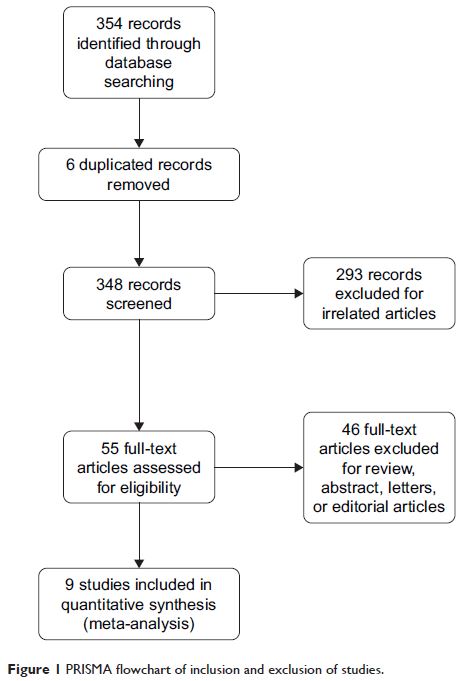108985
论文已发表
注册即可获取德孚的最新动态
IF 收录期刊
- 3.4 Breast Cancer (Dove Med Press)
- 3.2 Clin Epidemiol
- 2.6 Cancer Manag Res
- 2.9 Infect Drug Resist
- 3.7 Clin Interv Aging
- 5.1 Drug Des Dev Ther
- 3.1 Int J Chronic Obstr
- 6.6 Int J Nanomed
- 2.6 Int J Women's Health
- 2.9 Neuropsych Dis Treat
- 2.8 OncoTargets Ther
- 2.0 Patient Prefer Adher
- 2.2 Ther Clin Risk Manag
- 2.5 J Pain Res
- 3.0 Diabet Metab Synd Ob
- 3.2 Psychol Res Behav Ma
- 3.4 Nat Sci Sleep
- 1.8 Pharmgenomics Pers Med
- 2.0 Risk Manag Healthc Policy
- 4.1 J Inflamm Res
- 2.0 Int J Gen Med
- 3.4 J Hepatocell Carcinoma
- 3.0 J Asthma Allergy
- 2.2 Clin Cosmet Investig Dermatol
- 2.4 J Multidiscip Healthc

iNOS 和 eNOS 多态性与胃癌风险之间的遗传关联: 一个荟萃分析
Authors Zhu Y, Jiang HG, Chen ZH, Lu BH, Li J, Peng YP, Shen XN
Received 8 January 2018
Accepted for publication 5 March 2018
Published 3 May 2018 Volume 2018:11 Pages 2497—2507
DOI https://doi.org/10.2147/OTT.S161925
Checked for plagiarism Yes
Review by Single-blind
Peer reviewers approved by Dr Cristina Weinberg
Peer reviewer comments 2
Editor who approved publication: Dr Ingrid Espinoza
Objective: There are a number of susceptible factors for an increased risk of
gastric cancer. Nitric oxide (NO) is considered to be associated with the
development of a range of cancers. In particular, inducible nitric oxide
synthase (iNOS) and endothelial nitric oxide synthase (eNOS) are known to play
a central role in the production of NO. Published studies relating to the
association between eNOS rs1799983,
rs2070744, and iNOS rs2297518
polymorphisms and the risk of gastric cancer risk are conflicting and
inconclusive and require further analysis.
Materials and
methods: This study involved a meta-analysis
of case–control studies relating to eNOS rs1799983,
rs2070744, and iNOS rs2297518
polymorphisms published prior to January 2018. Literature searches were carried
out in PubMed, Embase, Web of Science, the Cochrane Library databases, and the
Chinese National Knowledge Infrastructure. Pooled odds ratios (ORs) and 95%
confidence intervals (CIs) were used to evaluate the strength of association
based on genotype data.
Results: A total of 1,356 cases and 1,791 controls were included from nine case–control
studies involving eNOS rs1799983
(G894T), rs2070744 (T-786C), and iNOS rs2297518
(C150T) polymorphisms. Data analysis indicated that iNOS rs2297518 was a risk
factor for Helicobacter pylorus -positive
gastric cancer when compared with H. pylorus -negative
gastric cancer (p =0.003, OR [95% CI] =2.19
[1.31–3.66]). In addition, the allelic, dominant, and recessive models of eNOS rs2070744 were
significantly associated with a risk of gastric cancer (allelic model: p <0.00001, OR [95% CI] =0.23
[0.16–0.34]; dominant model: p <0.00001, OR
[95% CI] =0.25 [0.15–0.42]; recessive model: p <0.00001,
OR [95% CI] =0.16 [0.08–0.30]). No association was identified between eNOS rs1799983 and the risk
of gastric cancer (p >0.05).
Conclusion: iNOS rs2297518 and eNOS rs2070744
polymorphisms may represent susceptible factors for gastric cancer.
Keywords: inducible nitric oxide synthase, iNOS, endothelial nitric oxide
synthase, eNOS, gastric cancer, meta-analysis
